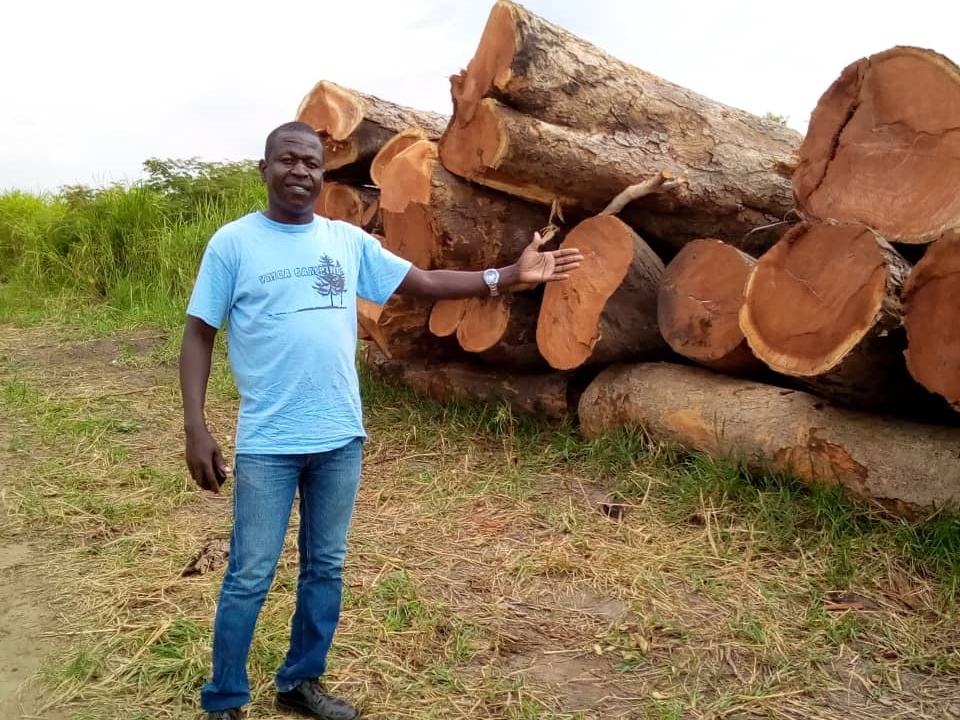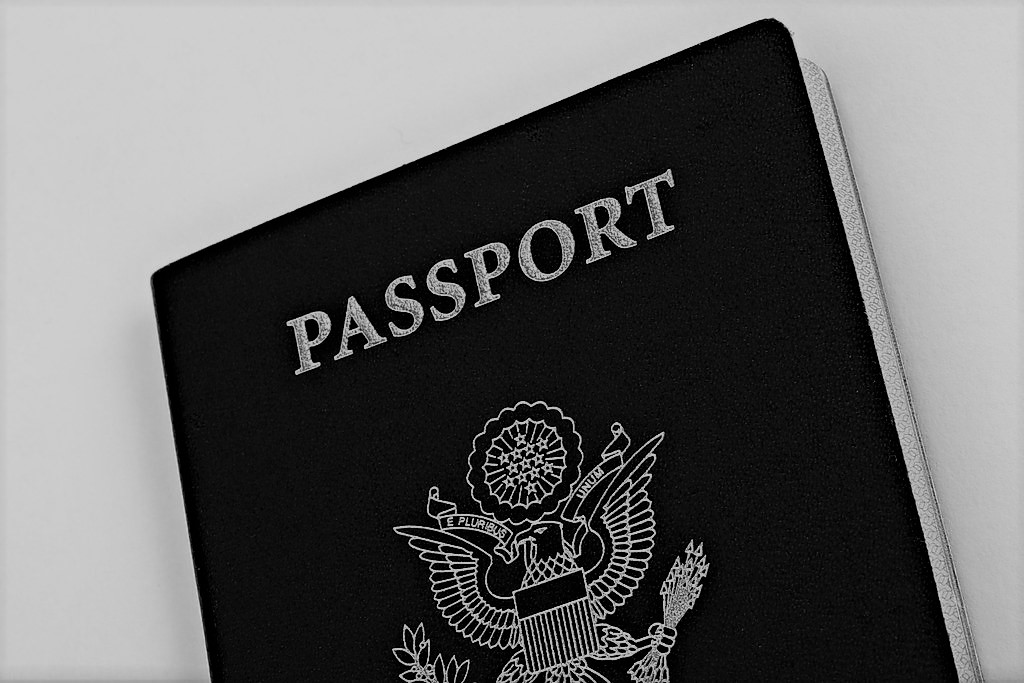Zoka forest covers an area of 25 square kilometres in North West Uganda. It is the only natural rainforest in the region and is unique in that it is composed of tropical areas, savannah and woodland. It houses 75% of the world’s butterfly species and is also a breeding ground for the edible grasshoppers so popular in Uganda. But the most important inhabitants are perhaps the Afzelia Africana trees or African mahogany and the so-called charcoal tree. The latter can be used for fuel, paper and pulp production, rope-making and has numerous medicinal properties. It may be used to treat anything from sore throats and asthma to gonorrhea and toothache. William Amanzuru Leslie, winner of the EU Human Rights Defenders Award, 2019, grew up in this area. ‘I have a feeling that nature was born in me, so I can’t live without it,’. The simple sincerity of this statement, belies a life threatening battle that William has faced since he decided to ‘speak for the trees because they can’t speak for themselves’. He has faced death threats, break-ins and has had to send his wife and children to live 500km away in order to ensure their safety. Can the Friends of Zoka movement, that he and 6 others founded, save the remaining 35% of this special piece of Ugandan heritage?
Zoka Central Forest Reserve has been designated as a protected area by the Ugandan government. However, from around 2013, William tells me that he and others who lived in the area saw the forest ‘coming under massive attack by those who were meant to be protecting it’. In less than six years 65% of the indigenous Zoka forest was destroyed. William noticed large-scale logging activities taking place there. He and a few other concerned citizens felt that they could not simply sit by and do nothing. So they started asking questions in search of ‘a peaceful answer’ as William puts it.
This lead to the creation of a small local movement calling themselves Friends of Zoka, in 2015. Members took it upon themselves to walk to a government office, William explains, and ask questions about what was happening to the forest. Slowly word spread, he says with quiet pride. More and more people expressed an interest in what we were doing. Their first meeting involved no agenda and there was no chairperson, nor secretary. ‘Everyone was a chairperson, everyone was a secretary’, says William, who later took on the role of deciding which concern should be addressed to which government office, i.e. the Forestry department or the central government and so on.
Friends of Zoka as a large WhatsApp group
The movement does not have any fixed offices or address. Distances in Uganda, even within a district area are large and transport is often on foot. In August 2016, William decided to create a WhatsApp group for all those interested and involved in the initiative. They started simply by sharing questions, comments, articles, even songs and poems. In this way, the sense of community and dedication to the cause grew.
However, they also decided to include those who were not friends of Zoka forest but who had power and interest in and over it. ‘We then decided to handpick government agencies, leaders, loggers and others who are responsible for what is happening to the forest’, William explains calmly. So it became ‘an enclosed family question’ he adds, not without a note of irony. I ask William what happens if one of these individuals chooses to exit the group. He agreed that they had had instances of people exiting but they simply re-added them and followed this up with a question like, ‘Why did you leave the group…..? We know you destroyed the environment…’ The dynamics of group pressure are clearly at work here.
The WhatsApp group creates important dynamics among its members.
As the activist explains, ‘the community knows that the car such a person drives, the food they eat, the house they live in, is an abuse of the environment.’ So oftentimes, such individuals choose to ‘stay dormant’ in the group, rather than attract attention by leaving. However, these same individual can find themselves drawn in to arguments in an attempt to defend their often already tarnished reputations. Accusations have been made within the group regarding meeting places, exchange of money and other key details linked to illegal logging in Zoka Central Forest Reserve. William now collects all these conversations, raises money and then pays a local radio station to broadcast the conversations. Via an interview with William, all of the news from the WhatsApp group is disseminated to the local community.
He explains to the listeners that they are a WhatsApp group of around 250 people. William goes on to ‘name and shame’ in an effort to call to account those who live in the area and are involved in illegal logging in Zoka forest. As a result, some of the local loggers are now known to the Adjumani community. William asks them to shun these people, in order to create shame among the community for destroying their natural heritage. In some cases, it works. William tells me that all three local loggers who he has confronted personally, broke down in tears in response to his question; why are you doing this?
‘I have made one of the most painful decisions a father can make’ – William Amanzuru.
William speaks with humour and conviction but he pays a high personal price for his decision to spear-head the Friends of Zoka movement. The is the second year in which he has lived apart from his wife and children. ‘I have made one of the most painful decisions a father can make and at times it breaks me down.’ The question that haunts him he tells me, is ‘How will my children look at me when they come of age, because I have made a decision without consulting them.’ The decision to move his family 500kms away was prompted by numerous threats and break-ins but got to a critical point when William was tipped off about a plan to kidnap his children. It was at this point that he made the difficult decision to send all four of them (two adopted and two biological) along with his wife to live in relative safety elsewhere.
However William’s own safety continues to be threatened. He tells me that in January of this year ‘a very powerful woman who works for the Ministry of Health threatened to kill me.’ William came across her in Zoka forest on one of his regular rounds. She was in the company of a group of loggers, felled trees nearby and chain saws lying on the ground. In response to his question, ‘What are you doing here?’ she grew incensed and threatened him with a knife. Later she arranged a roadblock for William and his colleagues and was there waiting for them with a can of petrol in her hands. ‘But again we managed to elude her’, William tells me with characteristic understatement. William tells me that he is attacked all the time on social media but has learnt to take this in his stride.
The activist remains committed to a peaceful approach. He believes that this is what has helped win him so many supporters from the local community. ‘I come head on with the loggers – loggers who literally held me at gun point at times, but I tell them, “It’s beautiful, you can kill William now but the challenge is, that someone else may take my place, someone greater than William. So for how long will you keep killing? If you think killing is sustainable, then keep killing. If not, then let’s talk.”’ He admits that he feels he has had success with such an approach. He has spoken with three local loggers in this way and tells me that ‘they have found such discussions so touching that they have broken down’.
‘If you look at what we have done, it is quite tremendous.’ – William Amanazuru
Looking ahead, William would like to build on the structure of the movement he has begun. He increasingly receives demands from across the country to talk to communities about environmental issues. Travel is time consuming and expensive so the activist often shares his knowledge and advice with communities via phone. To date, the organisation has no physical office. ‘I think this is hard for people to believe. But if you look at what we have done, it is quite tremendous.’
He believes that ordinary people see the beauty of such a set-up as it makes the prospect of beginning their own, similar initiatives more realistic. William also emphasises the priority they give to trust and transparency. ‘In the work we do, we trust everyone’. From the WhatsApp discussion group, he spreads the word via local radio, church leaders and at community meetings. In this way, trust grows and with trust, more information is gathered and progress is made.
Trust and transparency are everything.
‘In the work we do, we trust everyone.’ Transparency is their strength. This and his determination to bring the ‘elite discussion’ taking place on the WhatsApp group to the wider community. This is done through radio talks, community meetings, even the help of church leaders in explaining what has been posted on WhatsApp. In this way, one creates trust in the realities of this problem. Once trust is achieved, it is easier to gain more information from all community members.
In March of this year, Friends of Zoka and a number of other environmental activists completed a 470 km walk from Kampala, the capital, to William’s home town in the Adjumani district. Designed to raise awareness across the country about the ecological importance of Zoka Forest, it involved the planting of trees at each town and village they passed along the way. Each tree was named by local inhabitants and William and his fellow activists took time to talk with them and share the idea that ‘the environment should be looked at as our source of livelihood, our source of life!’. William Amanzuru admits that by the time they reached his home town he was very emotional – ‘I couldn’t believe I had walked all the way from Kampala and now I was home.’
‘Corruption has become a ministry of its own in Uganda’ – William Amanzuru.
Home and community is clearly something that William feels very strongly about. A social worker and counsellor by training, William also has a legal background and so he offers those in his district free legal advice and helps with social issues too. He tells me that he has no interest in politics per se, but wishes to help strengthen accountability and transparency at the local political level through citizen participation. This in spite of the fact that corruption and impunity are rife across all levels of government.
‘As a country we have lost a grip on our own identity. People believe that they are the law and the law is themselves’. He blames this on what he terms the death of institutions in Uganda. This is why personalities rise above these institutions and believe that they are more powerful than them, he explains. ‘Corruption has become a ministry on its own. It is a ministry that is not funded, it is a ministry headed by everyone, it is a ministry that has employed all Ugandans. But silently we don’t want to talk about it.’
But William Amanzuru is talking about it. What’s more, he is encouraging local communities to come together and talk about it too. In particular, he is helping to foster a growing awareness of the value of the environment which is so much a part of his Ugandan heritage. Coming from Africa myself, I can only wish that more men and women like William Amanzuru will come forward and lead their communities with peace and dignity, into the future.


